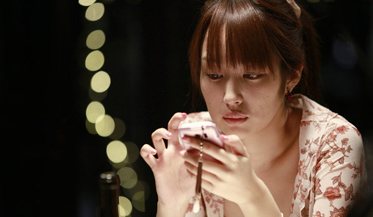Movie Review: Like Someone in Love
By Matthew Huntley
February 18, 2013
BoxOfficeProphets.com

Of course, the movie being slow, calm and patient would be for nothing if we didn’t also care about what was happening, or to whom. The value of a film should ideally be measured irrespective of its context, and Like Someone in Love isn’t good just because it’s different from other movies, but because its qualities are effective on their own terms. Its appeal develops out of its raw and intimate portrayal of its characters, who are sad and lonely. In fact, this entire film is sad, although this shouldn’t be a turn-off, because like any sad thing, it allows us the opportunities to reflect, empathize and find a deeper meaning within ourselves. It also reminds us that underneath any amount of regret or fear we have, there’s always hope that life can get better.
The film takes place over a period less than 24 hours in Tokyo. In a dark yet crowded café, a college student named Akiko (Rin Takanashi) talks on her cell phone to her boyfriend, who’s clearly upset about something. Later on, we learn that he actually considers himself to be her fiancé, although we’re not entirely certain the feeling is mutual. In reality, Akiko isn’t happy, not with him and certainly not with her chosen lifestyle.
To pay for school, Akiko works as a call girl, which has left her feeling shameful and forlorn. She has to hide her advertised pictures from her boyfriend lest he become enraged, and it pains her when her grandmother calls and says she saw her picture in an ad at the train station. Her pimp, if you will, who’s just a quiet old man, puts her in a cab to meet her next client, and the movie holds on Akiko as she listens to the seven voicemails on her phone. At one point, she asks the driver to pass by the train station, where her poor grandmother has been waiting all day.
When she finally arrives at her destination, it’s the apartment of a kind and gentle old man and former sociology professor (Tadashi Okuno). Akiko notices all the books he has and he explains he now works as a translator. One of the best things the movie does is refrain from explicitly saying whether or not this sweet old man actually wants sex or just a companion and someone to talk to. Perhaps his motivations started out one way but then changed once he met Akiko and saw how fragile and unhappy she was, despite the front she puts up by telling racy jokes and talking about his painting.
The movie is able to keep a consistent mystery about its characters because it films them more or less in real time and what we learn about them is only what they divulge to each other. There are lots of long takes and few edits, but this style keeps us engaged because as we see Akiko and the old man behaving naturally, they become more sympathetic and interesting. We grow curious about their motivations and where the story will eventually lead them. True: we often question where the movie is going, or even why we should care about it, but somehow we do, and once we accept it’s not going down a traditional narrative path, we simply sit back and watch it with no expectations.
Writer-director Abbas Kiarostami, an Iranian-born filmmaker, is fascinated by the way people talk and interact with their surroundings, even if it’s as banal as pouring a glass of milk or turning on the stereo. He’s a keen observer of mundane human behavior, and while the movie dawdles in spots, it remains unpredictable. Just as in life, we don’t know what’s going to happen next.
Much of the dialogue sounds improvised and I sensed Kiarostami simply told his actors the cameras were rolling and they could talk about anything they wanted. But he allows each scene to finish out. Nothing feels rushed, and while this slow approach wouldn’t work for all movies, it does here.
Eventually, Akiko and the old man’s relationship evolves to the point where he feels he must protect her. The next day, he drives Akiko to her university and we meet her fiancé (Ryo Kase), a skinny, short-tempered young man who has a lot of pent up anger and frustration. Despite what he says about being cool and collected, we get the impression he’s ready to crack at any minute. He’s very well played by Kase, who, despite his size, has a strong and intimidating presence.
I have my reservations about the ending, which was the only one point in the film where I felt manipulated, even though the final scene is arguably effective. It made me wonder if Kiarostami had lost his trust in the audience or faith in his own storytelling abilities, because he seems hastily compelled to end it on a sensational note just to reassure us it was building up to something.
Regardless, the film leaves us with a lot to think about: the day-to-day decisions we make; how we sometimes feel trapped by the very circumstances we impose on ourselves; or the kindness of strangers. Not only is Like Someone in Love an observant film, it’s a film that invokes observation. It’s clear that was one of Kiarostami’s intentions.